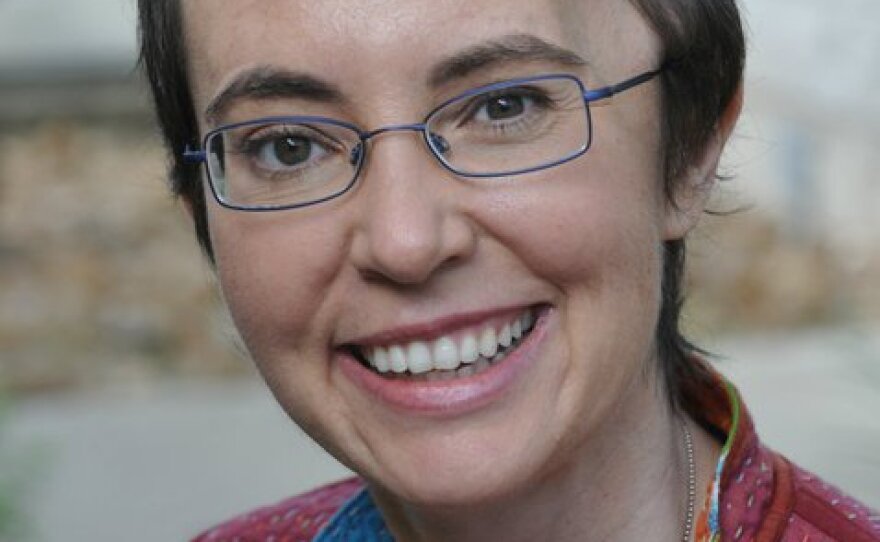A year ago, a seriously troubled man opened fire in a Safeway parking lot on a beautiful Saturday morning. He killed six people and injured 13 more, including Congresswoman Gabrielle Giffords, (D-Ariz.). who continues to recover from a bullet wound to the head.
Since then, Arizona has been forced to confront how it treats the mentally ill. And there is still work to be done.
At Tucson's International School for Peace, a group of kids stood in a mostly straight line, carefully following the chorus to their song: “I’ve Got Peace Like a River.” They were well-dressed for this important day. Each clutched a white balloon that will be let loose against the backdrop of the Catalina Mountains behind them.
It's a language immersion school and their singing was the first event in a long weekend of events throughout the city designed to bring hope and peace after the shootings.
Art Aldag was in the crowd watching. He says an event like this is necessary to help a city recover from a tragedy like the Tucson shootings. But he says the bigger questions of mental health and how to care for the mentally ill still needs to be addressed and that's a much tougher mandate than celebrating peace.
"Here at our church, we’re having an adult ed program after the service on Sunday which is going to pertain to that particular issue,” Aldag said. “What sort of things we can do and what sort of signs there are to let us know when someone might need some compassionate help."
Mental health experts say that there’s an uncomfortable stigma when we talk about the mentally ill that people in Arizona had to confront after the shootings. Vanessa Seaney is with the Community Partnership of Southern Arizona, a group responsible for the public mental health systems around Tucson.
"When there is potentially a mental health issue, often it’s because of the stigma, just like you stated. People don’t want to talk about it,” Seaney said. “And what happens is the issue doesn’t present itself until it’s at a crisis state."
Giffords Leads Vigil In Pledge Of Allegiance
The crowd at the vigil Sunday night was as much there to see Congresswoman Gabrielle Giffords as they were to put a closure on the Tucson shootings that happened one year ago.
Wearing a brilliant red scarf, Giffords climbed the stairs slowly. She smile and waved at the cheering crowd on the University of Arizona campus. Her husband carefully walked her to center stage. Then she pinned her right hand to her chest with the left and led the pledge of allegiance.
She spoke carefully, putting an emphasis on the closing: "One nation under God, indivisible and liberty and justice for all."
Giffords sat quietly through the rest of the ceremony, as Ron Barber, himself shot in the attacks, emceed the event. The message was one of recovery for the victims but also for the city. It was a point her trauma surgeon, Dr. Peter Rhee, expounded on.
"Let’s also not forget to get past our sorrow and move forward with our lives,” he told the crowd.
That’s what happened with the accused shooter, Jared Lee Loughner.
He attended Pima Community College for five years. In 2010, he was suspended after public outbursts. He could not return without a mental health clearance. At the time, school officials considered the issue closed.
About two months later, Loughner brought a Glock-19 handgun to the Safeway parking lot. There have been some changes in the aftermath.
After the shootings, the college hired psychologist Dr. James Sanchez. His job is to train staff to identify potential threats in the classroom. Sanchez says these changes have only happened at local levels.
“From a regulation perspective or from federal privacy laws, nothing has changed [as far as those legal areas]. After we have difficult situations, folks want to have easy solutions and easy answers," Sanchez said. "And one of the things that’s very difficult in our society is to balance personal freedoms and personal rights with personal responsibilities.”
Since the shootings, Sanchez has trained about 150 instructors and staff. Vanessa Seaney’s office has also begun training the general public in what she calls mental health first aid. So far, 600 have signed up in southern Arizona.
In other words, people are talking about mental health; that’s been one change. But at the same time, Arizona’s budget cuts have eliminated support for about 12,000 people suffering from mental illness last year.
Loughner has pleaded not guilty to 49 charges stemming from the shootings, including murder. He remains held at a Missouri prison where he is being treated for mental illness. His defense attorneys claim he is unfit to stand trial.
Eventually, a federal judge will have to decide whether he will stand trial.







